Buzzfeed breached UK ad code with ‘misleading’ content

US media company Buzzfeed violated UK rules on sponsored content for failing to correctly label a fake article, according to the Advertising Standards Authority (ASA).
The watchdog received a complaint about Buzzfeed’s ‘listicle’ “14 Laundry Fails We’ve All Experienced” published in October, which featured social media posts and a live feed from Dylon’s “Colour Catcher” Facebook page.
The ASA ruled Buzzfeed breached the Committee of Advertising Practice (CAP) Code, specifically rules 2.1 and 2.4 (recognition of marketing communications).
Rule 2.4 states: “Marketers and publishers must make clear that advertorials are marketing communications; for example, by heading them 'advertisement feature'."
This is the first time the site has come under fire for violating UK ad standards.
BuzzFeed breaks UK ad rules over misleading advertorial https://t.co/XdC3IMxu1l
— ASA (@ASA_UK) January 13, 2016Buzzfeed was told to ensure “ads were obviously identifiable as marketing communications, including using labels other than ‘Brand Publisher’ for advertorials.”
The ad was no longer available on Buzzfeed on Wednesday.
BuzzFeed 'laundry fail' native ad banned by ASA https://t.co/yJXiVLZ0DI#bannedpic.twitter.com/vjiyeT7iKh
— Marketing Magazine (@MarketingUK) January 13, 2016Buzzfeed, which calls itself "The Media Company for the Social Age", targets advertisers by creating ‘branded content’ aimed at young people.
The US cartoon series “South Park” recently parodied the “vortex” of sponsored content on the internet.
Last April, Buzzfeed was forced to admit it deletes editorial content due to advertiser pressure, highlighting the constraints of a business model built around catering to their needs.
An investigation revealed it removed articles about Microsoft, Pepsi, and Unilever following direct and indirect pressure from advertisers.
“Why Monopoly is the worst game in the world, and what you should play instead” was also pulled within 24 hours, which Gawker claimed was due to Buzzfeed's new marketing campaign with Monopoly’s maker, Hasbro.
READ MORE: The Ultimate Guide to Mainstream Media - Buzzfeed
Gawker also revealed Buzzfeed pays millions to social media sites to boost its clients’ ad campaigns while Tech Crunch reported 75 percent of Buzzfeed’s referral traffic comes from social media sites.
The company spent $5.8 million in the first six months of 2014 on “third party websites and platforms to fulfill customers’ advertising campaigns.”
Buzzfeed claims the violation was due to a lack of ASA direction on ‘native advertising’, which involves making an ad look like the site’s editorial content, and that the company used the US guidelines instead.
Buzzfeed said the ad contained Dylon’s name, logo, and the phrase “Dylon Brand Publisher” in place of the author’s byline, which they claim was enough to show that it was an ad.
The end of the article said: “It’s at times like these we are thankful that Dylon Colour Catcher is there to save us from ourselves. You lose, little red sock!”
“While we acknowledged that these elements implied a connection with Dylon, we considered they were not sufficient to make clear that the main content of the web page was an advertorial and that editorial content was therefore retained by the advertiser,” the ASA explained in its ruling. “We further noted that the web page was very long and visitors to it would therefore not see the reference to Dylon Colour Catcher at the bottom of the page until they had already engaged with the content.”
Come on, 'fess up, who's experienced some of these major laundry fails from @BuzzFeed? https://t.co/iZaf56g73g - tragic but hilarious!
— DYLON Fabric Dyes (@DYLON_UK) October 26, 2015The publisher said that on the site’s homepage, the ad for the article contained a yellow label saying “promoted by.” In the search listings, there was also a yellow label saying “advertiser”.
While the ASA agreed the labeling on the homepage was sufficient, readers accessing the content from other channels would not know that this was advertorial.
“Because consumers could arrive at the advertorial via a range of other means we considered it was necessary for it to be made immediately clear on the web page itself that it featured advertorial content,” the ASA stated.












